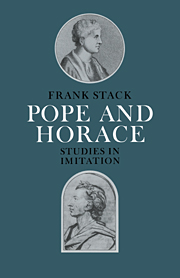Book contents
- Frontmatter
- Contents
- Acknowledgements
- List of abbreviations
- Preface
- PART I INTRODUCTIONS
- PART II THREE HORATIAN SATIRES (1733–4)
- 3 Raillery and energy: The Imitation of Satire II.i.
- 4 Horace, moral: The Paraphrase of Satire II.ii.
- 5 Horace, immoral: The Imitation of Satire I.ii. (Sober Advice)
- PART III MATURE HORACE (1736–7)
- PART IV THE TIME OF TENSION (1738)
- Epilogue
- Appendix: Imitations of Horace published 1730–40
- Notes
- Bibliography
- Index
5 - Horace, immoral: The Imitation of Satire I.ii. (Sober Advice)
Published online by Cambridge University Press: 08 January 2010
- Frontmatter
- Contents
- Acknowledgements
- List of abbreviations
- Preface
- PART I INTRODUCTIONS
- PART II THREE HORATIAN SATIRES (1733–4)
- 3 Raillery and energy: The Imitation of Satire II.i.
- 4 Horace, moral: The Paraphrase of Satire II.ii.
- 5 Horace, immoral: The Imitation of Satire I.ii. (Sober Advice)
- PART III MATURE HORACE (1736–7)
- PART IV THE TIME OF TENSION (1738)
- Epilogue
- Appendix: Imitations of Horace published 1730–40
- Notes
- Bibliography
- Index
Summary
Here is a piece of poetry from Horace come out, which I warn you not to take for mine, tho' some people are willing to fix it on me. In truth I should think it a very indecent Sermon, after the Essay on Man.
Pope to Caryll, 31 December 1734I hope he [Lord Duplin] will defend me from the imputation which all the Town I hear lay upon me, of having writ that impudent satire.
Pope to Oxford, 30 December 1734In December 1734 an obscene poem was printed in London, Sober Advice from Horace, based on Horace's notorious Satire I.ii. The work was anonymous, but, as the title-page stated, the author had ‘Imitated’ the Horatian poem ‘in the Manner of Mr. POPE’. In fact, he warmly dedicated the work to ‘ALEXANDER POPE, Esq.’: ‘Sir, I have so great a Trust in your Indulgence toward me, as to believe you cannot but Patronize this Imitation, so much in your own Manner, and whose Birth I may truly say is owing to you’ (TE, IV, p. 73). It did, nevertheless, contain some sharp satiric remarks on Pope and some of his close friends. The most shocking features of the poem, however, were the Latin text and the footnotes. The Imitation was printed ‘Together with the ORIGINAL TEXT, as restored by the Revd. R. BENTLEY, Doctor of Divinity. And some Remarks on the VERSION’ (TE, iv, p. 71). The most obscene words in the Latin poem stood out in large capitals, and ‘the Reverend Doctor’ repeatedly complained in the footnotes that the Imitator had not rendered them accurately enough, and, in the name of true scholarship, he indicated what they meant.
- Type
- Chapter
- Information
- Pope and HoraceStudies in Imitation, pp. 78 - 96Publisher: Cambridge University PressPrint publication year: 1985

